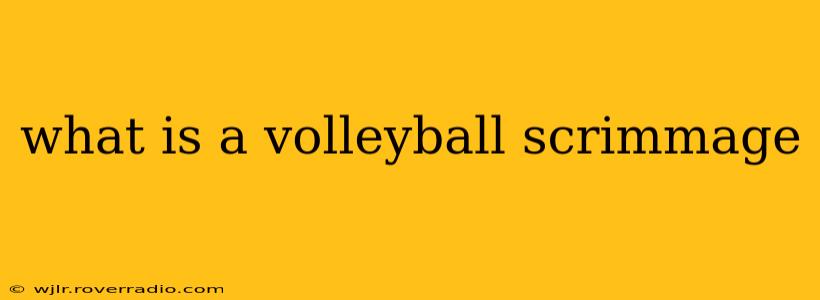A volleyball scrimmage is essentially a practice game, but with a bit more structure and intensity than a typical practice drill. It's a crucial part of volleyball training, bridging the gap between individual skills practice and competitive matches. Think of it as a dress rehearsal before the main performance. Unlike a formal game, the emphasis in a scrimmage is on practicing strategies, experimenting with different formations, and improving teamwork under game-like conditions. The score isn't the primary focus; the learning and improvement are.
What is the Purpose of a Volleyball Scrimmage?
The main purpose of a volleyball scrimmage is to provide players with a realistic game experience within a controlled environment. This allows coaches to:
- Assess player performance: Observe individual and team strengths and weaknesses in a more dynamic setting than drills. This helps coaches tailor future training sessions more effectively.
- Test strategies and formations: Scrimmages provide an opportunity to try out new plays, rotations, and defensive setups without the pressure of a formal match.
- Improve teamwork and communication: Players must coordinate their actions, communicate effectively, and learn to trust their teammates under pressure.
- Build stamina and endurance: Scrimmages simulate the physical demands of a match, helping players improve their stamina and endurance.
- Develop mental toughness: The competitive atmosphere, even in a practice setting, helps players develop mental resilience and the ability to perform under pressure.
How Does a Volleyball Scrimmage Differ from a Formal Game?
While both scrimmages and formal games involve gameplay, several key differences exist:
- Scoring: In a scrimmage, the score is often less important than the learning experience. Sometimes, scoring is modified or even ignored altogether. Formal games, conversely, have strict scoring rules and the final score determines the winner.
- Time: Scrimmages are typically shorter than formal games, often lasting only a few sets or a specific amount of time.
- Rules: While basic volleyball rules generally apply, some rules might be relaxed or adapted in a scrimmage to focus on specific aspects of the game. For example, referees might be absent, or substitutions might be less restricted.
- Intensity: While a scrimmage is more intense than regular practice, the overall intensity is usually lower than in a formal game. Players are encouraged to experiment and learn from mistakes without the added stress of a high-stakes competition.
- Officiating: Scrimmages often lack formal officiating, relying instead on players and coaches to manage the flow of the game.
What are Common Scrimmage Scenarios?
Coaches might use various scrimmage scenarios to target specific skills or aspects of gameplay. These could include:
- Full-court scrimmages: These involve the entire team and are designed to simulate a real game as closely as possible.
- Small-sided scrimmages: These might involve fewer players on each team (e.g., 3-on-3 or 4-on-4), focusing on specific aspects like quick sets or offensive plays.
- Specific skill scrimmages: These scrimmages focus on developing particular skills such as serving, passing, or blocking.
How Long Does a Volleyball Scrimmage Last?
The duration of a volleyball scrimmage varies greatly depending on the team's goals and the coach's preferences. It could range from a short 15-minute session focusing on a specific skill to a longer, more intense session that mirrors a complete game, perhaps lasting an hour or more.
Is a Volleyball Scrimmage Competitive?
While a volleyball scrimmage is a practice game, a level of competitiveness is inherent. Players naturally want to perform well, even without the pressure of a formal competition. The coach's emphasis on learning and improvement is key to ensuring the competitive spirit doesn't overshadow the learning objectives.
In conclusion, volleyball scrimmages are essential tools for developing players' skills, teamwork, and game-sense. They offer a controlled environment to implement strategies, evaluate performance, and build confidence before stepping onto the court for a formal competition.
